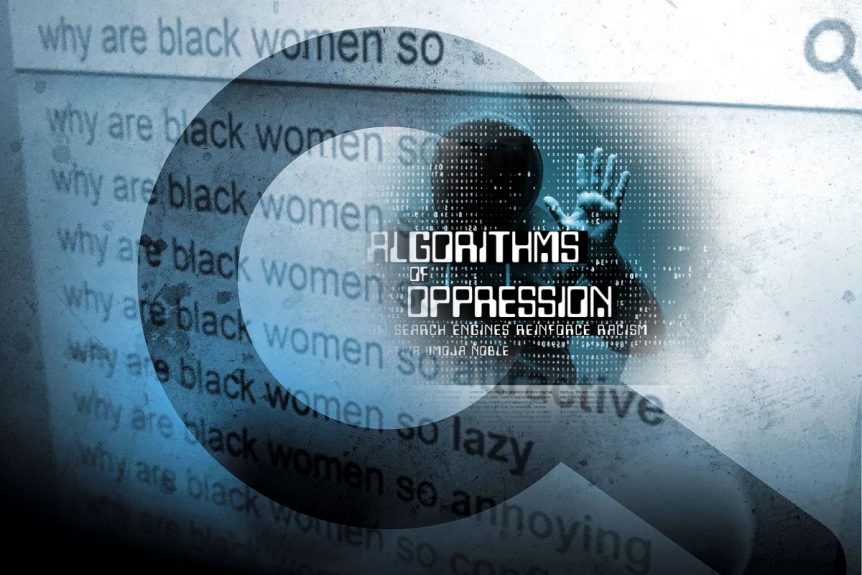HOW SEARCH ENGINES REINFORCE RACISM
August 2020
A revealing look at how negative biases against women of color are embedded in search engine results and algorithms
Run a Google search for “black girls”—what will you find? “Big Booty” and other sexually explicit terms are likely to come up as top search terms. But, if you type in “white girls,” the results are radically different. The suggested porn sites and un-moderated discussions about “why black women are so sassy” or “why black women are so angry” presents a disturbing portrait of black womanhood in modern society.
In Algorithms of Oppression, Safiya Umoja Noble challenges the idea that search engines like Google offer an equal playing field for all forms of ideas, identities, and activities. Data discrimination is a real social problem; Noble argues that the combination of private interests in promoting certain sites, along with the monopoly status of a relatively small number of Internet search engines, leads to a biased set of search algorithms that privilege whiteness and discriminate against people of color, specifically women of color.
Through an analysis of textual and media searches as well as extensive research on paid online advertising, Noble exposes a culture of racism and sexism in the way discoverability is created online. As search engines and their related companies grow in importance—operating as a source for email, a major vehicle for primary and secondary school learning, and beyond—understanding and reversing these disquieting trends and discriminatory practices is of utmost importance.
An original, surprising and, at times, disturbing account of bias on the internet, Algorithms of Oppression contributes to our understanding of how racism is created, maintained, and disseminated in the 21st century.
An original, surprising and, at times, disturbing account of bias on the internet, Algorithms of Oppression contributes to our understanding of how racism is created, maintained, and disseminated in the 21st century. Buy a Copy
Furthermore
There’s been a growing swell of concern in the academic community about the stranglehold that commercial (for-profit) search engines have over access to information in our world. Safiya Umoja Noble builds on this body of work in
Algorithms of Oppression: How Search Engines Reinforce Racism to demonstrate that search engines, and in particular Google, are not simply imperfect machines, but systems designed by humans in ways that replicate the power structures of the western countries where they are built, complete with all the sexism and racism that are built into those structures.
Search Engines Reinforce Racism
Many users operate under the misperception that when they do a Google search, what results are an objective listing of the most common or popular sites pertaining to their search. In fact, what results are what the commercial advertisers on Google either expect or want a user to be satisfied with. Search engine optimization strategies help to ensure that those with money can rig searches to keep their sites at the top, and far from combatting this trend Google and other technology companies have increasingly integrated revenue generation strategies into their information technology products.
Moreover, the architecture of search engines is constructed by predominantly white male engineers, without any real understanding of how the world works for anyone who is not like them (as recently as 2016, only two percent of Google’s workforce were African American and three percent Latino). Consequently, the search engines they build are implicitly designed to respond to the needs of people like them and to provide answers they expect to satisfy users who share those identities.
READ MORE
InnerKwest™ will continually and conscientiously resonate a message of unity. We will not relent, digress, or vary from that message to any degree. Please sign-in below to leave questions or comments.
We always welcome constructive contributions and commentary.![]()
Suggest a topic or issue to InnerKwest℠. We will post your suggestion on our projects board que. Should a writer tag your suggestion for review, you may see the respective narrative published at the appropriate time as determined by the editor. Leave your suggestion at the comments section below.
Spread the word about InnerKwest℠.
Thank you for your interest!
Please consider supporting the advertisers on InnerKwest. Presently we do not place Google Ads on our site. We are setup to do so, but we would prefer to allocate space to our subject matter. The narratives and issues impacting African-Americans and the culture is tantamount to the this platform. Every contribution, however big or small, is valuable to securing our future. Also visit and join the AMIBC Founders Club to maximize the total advantage of being a subscriber. Contribute by clicking on the advertisers featured on AMIBC site and utilize them.







